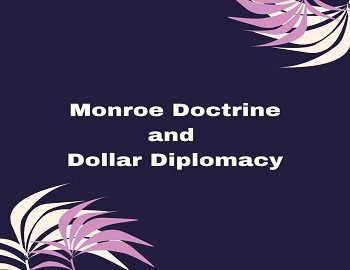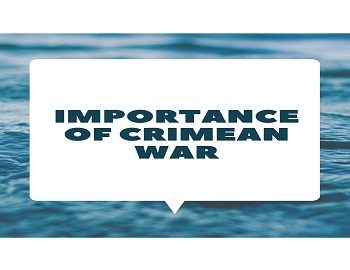Table of Contents
Monroe Doctrine and Dollar Diplomacy:
Monroe Doctrine:
It was the doctrine that was proclaimed in 1823 A.D. by the then President of the United States Mr Monroe. This doctrine warned the European powers against any attempt to extend their power in the Western Hemisphere. In 1895, the Monroe Doctrine was given a new meaning. There was a territorial dispute between British Guiana (now Guyana) and Nicaragua and the British threatened to send troops against Nicaragua. The U.S. government forced Britian not to send her troops and declared that ‘Today the United States is practically sovereign on this Continent’. A new Corollary was added to the Monroe Doctrine in 1904 by the U.S.President, Theodore Roosevelt. Britian and Germany had imposed a naval blockade of Venezuela as she had failed to repay the loan which she had taken from them. Theodore Roosevelt forced Britian and Germany to lift the blockade and declared that the United States alone had the right to intervene in the affairs of her neighbouring countries if they were unable to maintain order on their own. The United States took control of the finances of the Dominion Republic which she retained for about 30 years and occupied that country in 1916 for eight years. In 1906, American troops were sent to Cuba and remained there for three years to ‘protect’ Cuba from disorder. In 1909, American troops were sent to Nicaragua in support of a revolt that had been inspired by an American mining company. The United States secured from the government which had been installed there the right to intervene in that country to protect American interests. In 1915, American troops were sent to Haiti and remained there till 1934.
Dollar Diplomacy:
The extension of the ‘United States’ influence through economic investment in Latin America is known as the ‘Dollar Diplomacy’. The economic and political domination of South America was facilitated by the absence of strong governments in the countries of South America. Many of these countries were ruled by what is known as caudillos, or crude and corrupt military leaders with arm gangs. They floated loans for ready cash and sold concessions to foreign companies to make an investment to exploit the natural resources of their countries. They provided markets for manufacturers and sources of raw materials for industrialized countries, particularly the United Staes as well as avenues for an investment of capital by these countries. Most of the countries of South America though politically independent came under the economic and political control of the United States. For example- one of the major acquisitions by the United States at the beginning of the 20th century was the Panama Canal. A French company had started the construction of the canal in the Isthmus of Panama in Colombia (Central America). The canal which would link the Atlantic and the Pacific Oceans was of great economic interest. In 1901, the United States decided to undertake the canal project alone. She paid $40 million to the French company and entered into an agreement with the government of Colombia. According to the agreement, Colombia was to give the United States perpetual rights to a six-mile wide ‘canal zone’ across her territory in exchange for ten million dollars plus $250,000 as annual rent. The agreement was completely against the interests of Colombia and Colombia’s Parliament refused to ratify it. In 1903, the United States financed and organized a revolt in Panama and landed her troops there. Soon after, the United States recognized Panama as an independent state. The government of Panama signed a new agreement with the United Staes according to which the amount of compensation remained the same but instead of the six-mile wide canal zone, a ten-mile canal zone was granted to the United States. The canal was opened in 1914 and the canal zone was retained under the occupation of the United States then. The United States also extended its control in the Pacific during this period.









Comments (No)